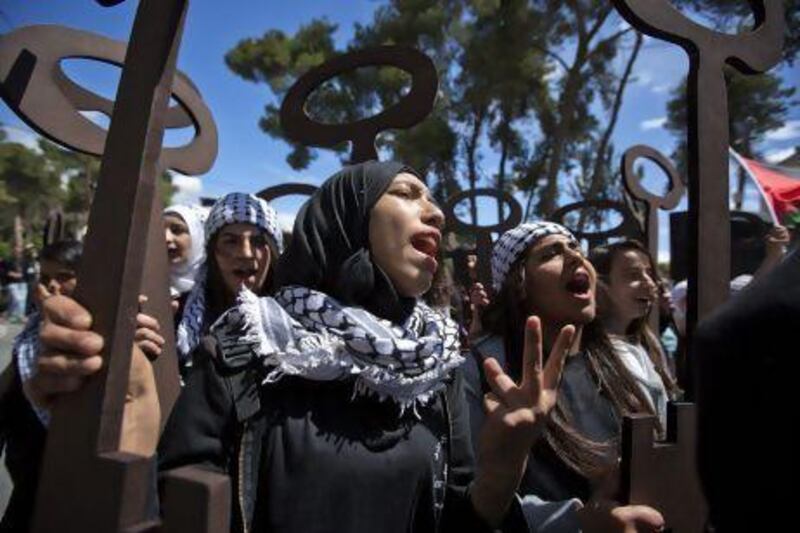RAMALLAH // Palestinians yesterday marked the loss of their ancestral homeland and their dispersion across the Middle East from the establishment of the state of Israel 65 years ago.
Sirens sounded for 65 seconds as thousands of Palestinians gathered in the main square of Ramallah, the de facto Palestinian capital, bowed their heads in silence.
Schoolchildren later chanted, "The right of return will not die", and demonstrators waved Palestinian flags and held up keys, symbols of homes that were destroyed or confiscated after Israel's creation in 1948.
"Palestinians want an end to our suffering, a return of our rights, and it doesn't matter if that means living in a state for Palestinians or in a state with Jews and Palestinians," said Mahmoud Flehfleh, 60, a musician from Ramallah.
Protesters fought with Israeli security outside a refugee camp near the West Bank city of Hebron, and at a prison near Ramallah, leaving several Palestinians injured.
Israeli police in Jerusalem scuffled with protesters, tossing stun grenades and making several arrests.
The protests and commemorations in the Israeli-occupied West Bank, the Gaza Strip, and in 58 Palestinian refugee camps across the region, came amid renewed promises by Hamas and Fatah to end their six-year split.
Palestinians refer to the anniversary as Yawm Al Nakba, or "Day of the Catastrophe".
Azzam Al Ahmed of Fatah said on Tuesday that the rival Palestinian factions agreed during talks in Cairo to form a national-unity government in three months.
A Hamas official, Moussa Abu Marzouq, confirmed the deal, telling the Palestinian news agency Maan that the two sides had held positive talks.
First signed in the Egyptian capital in May 2011, their reconciliation pact quickly foundered because of differences over how to end the Palestinian conflict with Israel.
Under the initial agreement, the factions were supposed to have formed a caretaker government of independent figures and then held national elections that would unite the West Bank's Fatah-run areas with the Hamas-controlled Gaza Strip.
At yesterday's rallies in Ramallah, there was scepticism about a possible deal.
"Our leaders are leaders who only use empty words," said Shadi Azzaza, 23, an unemployed Palestinian.
Mr Flehfleh said he doubted unity between Hamas and Fatah, or a Palestinian state, would ever be realised.
"The revolution is dead and so is the two-state solution," he said.
John Kerry, the US secretary of state, is trying to revive the Israeli-Palestinian peace process but acknowledged last month the possibility of creating a Palestinian state may close after two years.
Mr Kerry is due to return to the region on Tuesday next week in another bid to revive peace talks frozen since 2010.
About 700,000 Palestinians were expelled or fled the fighting of 1948, with Jewish forces levelling hundreds of their villages, commandeering their property and barring their return.
Some 5.3 million original Palestinian refugees and their descendants are registered with the United Nations Relief and Works Agency for Palestine Refugees in the Near East, created in 1949 to provide relief to those uprooted from their homes.
The total number of Palestinians worldwide has reached 11.6 million, figures released on Tuesday by the Palestinian Central Bureau of Statistics show.
About 5.8 million of them live in the occupied Palestinian Territories or as Arab citizens of Israel.
twitter: For breaking news from the Gulf, the Middle East and around the globe follow The National World. Follow us





